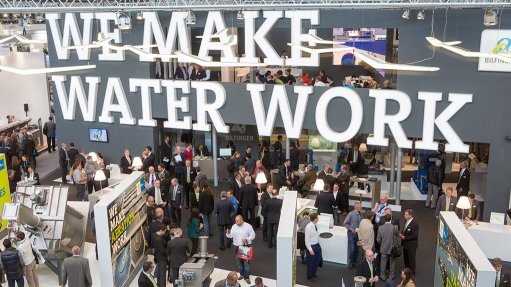
IFAT TRADE FAIR The water sector at IFAT will show how the industry is responding to water and sewage crises around the world
Owing to economic necessities and new legal regulations dictating the course in the international water and sewage industry, trade fair for water, sewage, waste and raw materials management IFAT – which runs from May 30 to June 3 in Munich, Germany – will showcase how the environmental technology sector is reacting to the challenges.
Innovations such as membrane bioreactors (MBRs) will be showcased at the trade show. This is because stricter sewage management guidelines, rapid population growth and bottlenecks in the water supply mean that the market for MBRs is growing.
The membrane growth procedure allowing water to be reused is gaining importance, particularly in urban areas. Mechanical engineering company Huber, in close partnership with Wiesbaden-based membrane and module manufacturer Microdyn-Nadir has been using the Vacuum Rotation Module (VRM) membrane filtration system successfully in municipal and industrial MBR processes.
The system has now undergone a fundamental redesign combining the benefits of the rotating membrane system with those of the tried and tested Bio-Cel module technology. High throughputs of up to 250 m3/h and, above all, energy efficient, highly effective membrane cleaning with less than 150 ℓ/m2 an hour of flushing air have been achieved.
The Bio-Cel modules also offer a long operating life and can be cleaned at low cost and, as ultrafiltration membranes, they ensure very good drainage quality. A full-size new membrane filtration system will be installed as one of the highlights at Huber’s IFAT stand.
Using small-pored filters to trap particles and microorganisms, such as bacteria or viruses, membrane specialist Inge will present ultrafiltration modules for horizontal applications at its IFAT stand.
Together with specialist from chemical company BASF, the development team has improved the membrane material and can now accommodate much more membrane area in the ultrafiltration modules, which means fewer modules are required for a water treatment system. Inge will present ultra- filtration modules for horizontal applications at IFAT as a solution aimed at the replacement and improvement of existing systems.
Digitisation, Agriculture and Industry Solutions
Multinational engineering company Siemens has announced innovations in the fields of automation and drive systems, industrial software and services, enabling companies and municipal authorities to minimise their use of resources and energy when treating water and sewage. These innovations will help to improve security of supply.
The ICeWater research project, in which the operation of pumps is optimised by analysing consumption data, shows the opportunities offered by digitalisation.
According to mechanical engineering company Flottweg, synthetic polymeric flocculants will not satisfy agricultural treatments in Germany from 2017. Only polymers where the sludge and the individual constituents have decomposed by at least 20% within two years will be permitted for use in sludge treatment.
Flottweg will announce at IFAT that its OSE decanter achieves very good results when thickening sludge using starch polymers. The starch-based flocculent is only needed to polish up the centrate in order to achieve a separation efficiency of over 95%.
Recycling specialist Pyreg is working on a contemporary solution for handling sludge and other biomass residues. The company will celebrate the successful commissioning of its first reference system in this area at IFAT.
Since September, a Pyreg module at the Linz-Unkel treatment facility, in Germany, has been fully converting dried sludge into a phosphorus fertiliser. The individual process steps are so intelligently linked that the resulting waste heat can be reused in a variety of ways. Energy and operating costs of over €200 000 could be saved each year.
Waste disposal company Veolia’s stand will focus on its industrial customers. It will present itself as an environmen- tal services provider able to offer solutions for water, waste disposal and energy from a single source.
Companies from sectors such as automotive engineering, healthcare and the food industry will benefit in particular from the integrated view of resource flows. When it comes to water, one key objective will be to offer municipal authorities and companies futureproof solutions for handling sludge. This is useful against a backdrop of changing basic conditions. It will include a strategy for phosphorus recycling, which will be compulsory in the future.